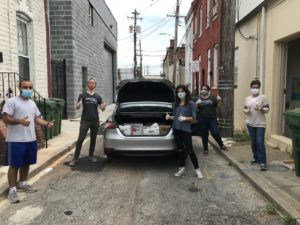Dozens of individuals have been able to prevent potential spread of COVID-19 in the last week by staying home and receiving food delivery from the Esperanza Center in a new effort that was borne from its multilingual hotline.
Across its more than 60 years serving Baltimore’s immigrant community, the Esperanza Center has provided education, health care, legal resources, family reunification services, clothing, used furniture, and other supports – but never food. Until last week.

Esperanza staff load up and prepare to deliver food to families preventing COVID-19 spread
That was when center staff delivered food and cleaning supplies to 20 families who had been tested for COVID-19, in an effort to limit the number of people who must leave their homes during the pandemic, particularly those who may have been exposed to the virus.
“One of the recipients sent us a message expressing the gratitude his wife felt, knowing that she was going to be able to keep her children safe because they received bleach and could disinfect their bathroom,” said Giuliana Valencia-Banks, the center’s outreach and building operations coordinator. “He also shared that it was the first time in a week that they were going to have fresh vegetables for dinner.”
The Esperanza Center operates out of ZIP code 21224 in Baltimore – the ZIP code with the highest rate of infection in the tested population, at above 24 percent. Part of the reason for that high rate of infection is the concentration of neighbors who have immigrated. Immigrant neighbors tend to live in a more crowded home than a non-immigrant home, and are more likely to have jobs deemed essential. So their exposure and likelihood of unknowingly spreading the virus is higher.
Still, the families who received food live in several areas. Families needing deliveries were identified based on calls to the center’s COVID-19 hotline, set up in April to serve the non-English-speaking population in Baltimore City and Baltimore and Anne Arundel Counties. The hotline, operated in partnership with Johns Hopkins’ Centro Sol, provides information and resources related to COVID-19, and allows staff to connect callers to other services or organizations, if needed.
St. Gabriel Church in Windsor Mill provided boxes of groceries for the distribution, and Esperanza staff used grant funding to supplement the supplies with culturally appropriate food, such as rice, beans, corn flour, tortillas, and spices.
The connections that the Esperanza Center has established with its clients matter in this moment, particularly because “the community we serve has a mistrust of the system,” said Valencia-Banks. She added that many immigrants worry about food distributions at schools and other government-established sites.
The center delivered food and supplies to families again this week, and expects to continue the service for as it is needed, deploying a handful of staff to make the deliveries.
“Folks who work at Esperanza are used to being with the community,” said Valencia-Banks. “We are excited to see them again, even in a socially distanced way.”
